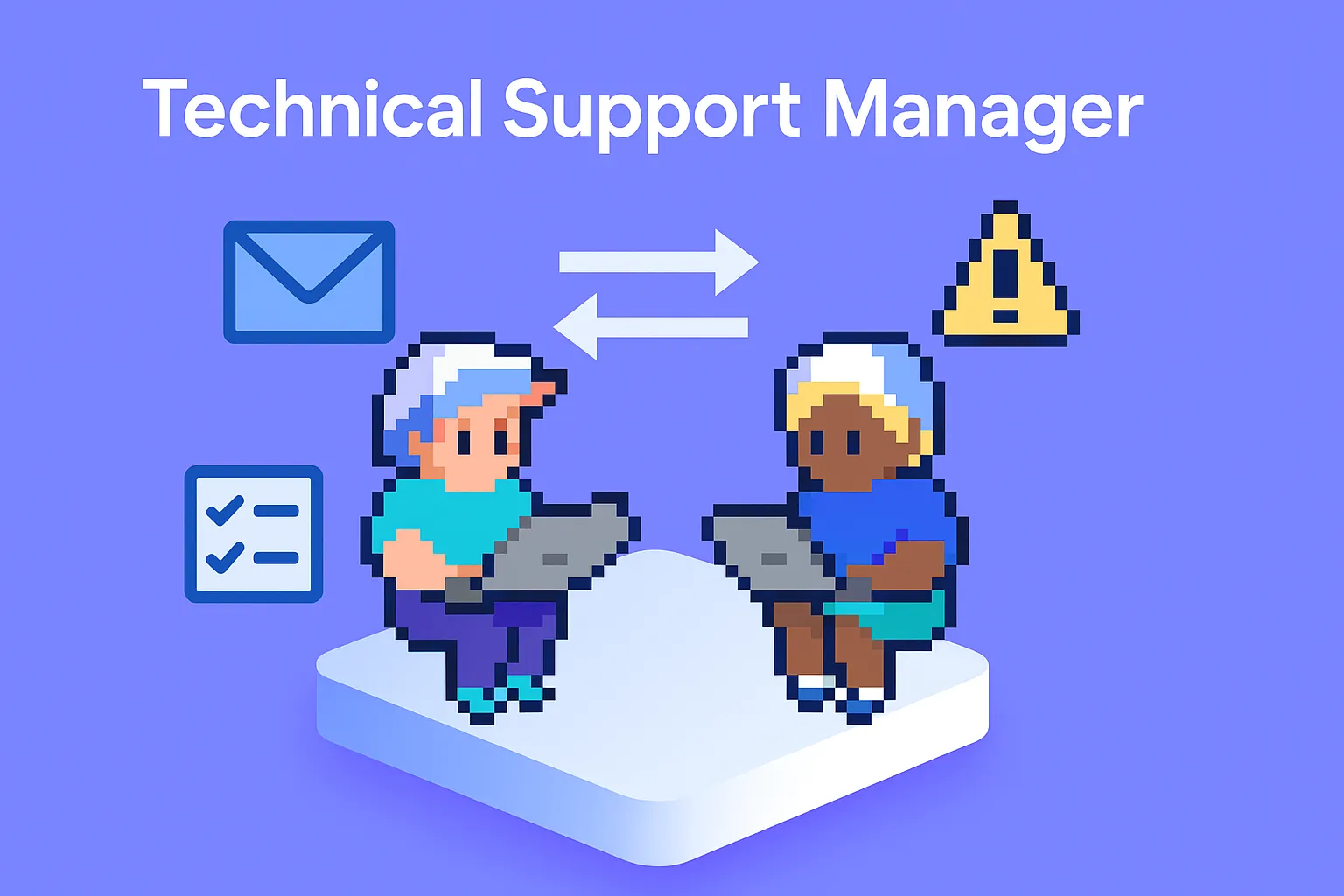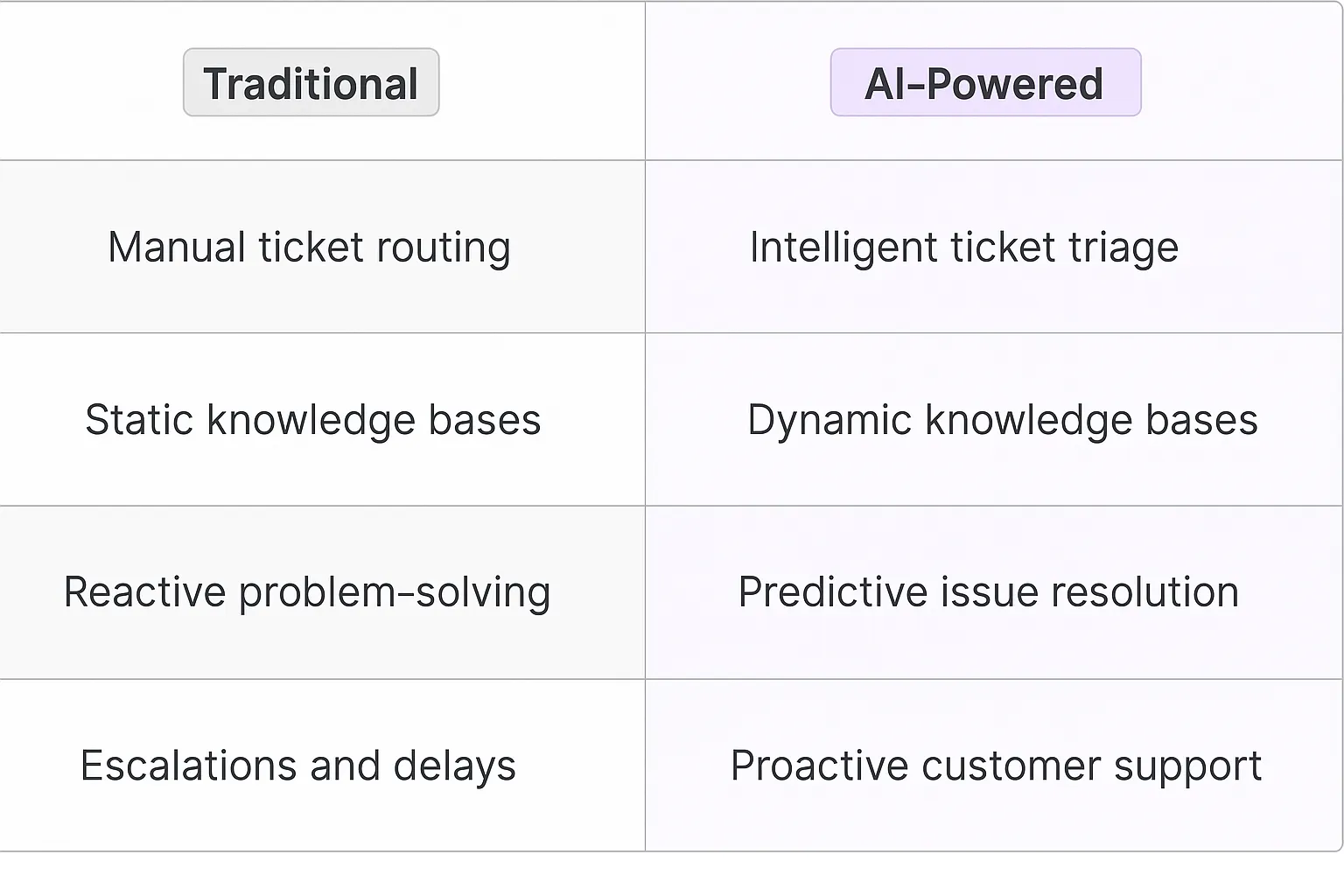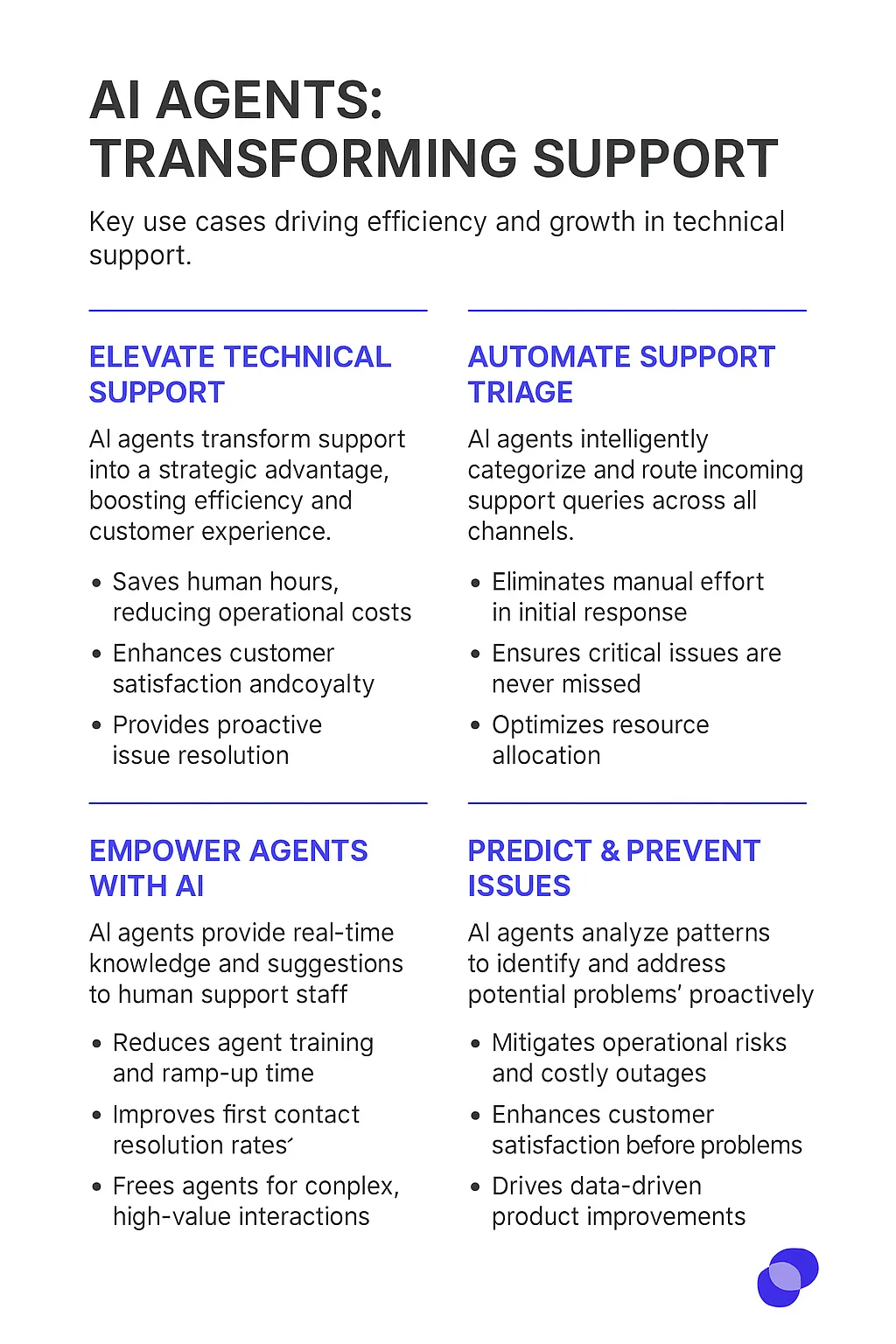Technical Support Manager is a cutting-edge AI-powered solution designed to revolutionize how companies handle customer support and technical issues. It's not just another ticketing system - it's a sophisticated digital teammate that works alongside human support staff to dramatically improve efficiency, response times, and overall customer satisfaction.

Before AI agents entered the scene, technical support managers were drowning in a sea of tickets, spreadsheets, and clunky knowledge bases. They'd spend countless hours triaging issues, manually routing tickets, and praying their team could keep up with the never-ending influx of user problems. It was like trying to bail out a sinking ship with a teaspoon – exhausting and ultimately futile.
Support teams relied on static FAQs, rigid decision trees, and the collective tribal knowledge of veteran employees. When a curveball came their way, it often meant escalations, delays, and frustrated customers. The whole system was a house of cards, ready to topple at any moment.
Enter AI agents – the secret weapon that's transforming technical support from a reactive firefight into a proactive powerhouse. These digital teammates are like having a army of expert support ninjas working 24/7, never needing a coffee break or a day off.
First off, AI agents are crushing it when it comes to ticket triage and routing. They're analyzing incoming issues in real-time, understanding context and urgency, and getting tickets to the right human experts faster than you can say "have you tried turning it off and on again?" This means critical issues get immediate attention, while routine problems get solved without ever hitting a human's inbox.
But here's where it gets really interesting: AI agents are learning and evolving with every interaction. They're building a dynamic, ever-expanding knowledge base that captures not just solutions, but the subtle nuances of how different problems manifest. It's like having a support team with perfect memory and the ability to instantly recall every ticket they've ever solved.
For technical support managers, this is a game-changer. Suddenly, they're not just putting out fires – they're predicting and preventing them. AI agents are spotting patterns in user issues, flagging potential product bugs, and even suggesting proactive measures to head off common problems. It's like having a crystal ball that actually works.
And let's talk about scalability. In the old world, growing your support capacity meant hiring and training more humans – a slow, expensive process. With AI agents, you can scale your support capabilities almost instantly. Got a sudden spike in users or launching in a new market? Your AI teammates have got you covered, providing consistent, high-quality support around the clock.
But perhaps the most exciting benefit is how AI agents are freeing up human support staff to do what they do best – tackle complex, nuanced issues that require creativity and empathy. By handling the routine stuff, AI is elevating the role of human support from "password reset button pusher" to "technical problem-solving wizard."
In essence, AI agents are turning technical support from a cost center into a strategic asset. They're not just solving problems faster – they're turning every support interaction into an opportunity to gather insights, improve products, and delight users. For technical support managers, it's like going from playing whack-a-mole to conducting a symphony of customer satisfaction.

Technical support managers are the unsung heroes of the tech world, juggling complex issues, team management, and customer satisfaction. Enter AI agents - the digital teammates that could redefine how support teams operate. These AI-powered tools aren't just about automating mundane tasks; they're about amplifying human capabilities in ways we're only beginning to grasp.
Let's dive into some game-changing processes where AI agents could make a real difference:
Now, let's break it down to the nitty-gritty tasks where AI agents can be true game-changers:
The integration of AI agents into technical support management isn't about replacing human expertise - it's about augmenting it. These digital teammates can handle the heavy lifting of data analysis and routine tasks, freeing up human agents to focus on what they do best: solving complex problems and building meaningful customer relationships.
As we stand on the brink of this AI revolution in technical support, the question isn't whether to adopt these technologies, but how quickly we can integrate them to stay ahead in an increasingly competitive landscape. The future of technical support isn't just about resolving issues; it's about predicting and preventing them, all while delivering an unparalleled customer experience. And AI agents are the key to unlocking this future.

AI agents are reshaping the landscape of technical support management, offering capabilities that extend far beyond traditional helpdesk solutions. These digital teammates are proving their worth across diverse sectors, each with unique challenges and requirements. Let's dive into some concrete examples of how AI is transforming technical support management in different industries, showcasing the tangible benefits and innovative approaches that are setting new standards in customer service and operational efficiency.
From healthcare to finance, retail to manufacturing, AI agents are not just answering queries; they're anticipating needs, solving complex problems, and continuously learning from each interaction. This isn't about replacing human expertise—it's about augmenting it, creating a symbiosis between human insight and machine precision that's elevating the entire field of technical support.
As we explore these use cases, we'll see how AI is tackling industry-specific pain points, adapting to regulatory landscapes, and even reshaping the role of technical support managers themselves. The result? A new paradigm in support that's more proactive, personalized, and powerful than ever before.
The e-commerce industry is ripe for disruption when it comes to technical support. Enter AI-powered Technical Support Manager agents – the secret weapon that's about to change the game for online retailers.
Picture an e-commerce giant like Amazon or Shopify. They're dealing with millions of customer inquiries daily, ranging from simple "Where's my order?" questions to complex technical issues with their platforms. Traditional support systems often buckle under this pressure, leading to long wait times and frustrated customers.
AI Technical Support Managers can transform this landscape. These digital teammates can instantly triage incoming support tickets, categorizing them based on urgency and complexity. They can then either resolve simple issues immediately or route more complex problems to the appropriate human specialists.
But here's where it gets interesting: These AI agents don't just pass the buck. They learn from every interaction, continuously improving their knowledge base. Over time, they become capable of handling increasingly complex issues, freeing up human agents to focus on the most challenging problems and strategic initiatives.
For e-commerce platforms, this means dramatically reduced response times, improved customer satisfaction, and significant cost savings. It's not just about answering questions faster – it's about creating a support ecosystem that evolves and improves with every interaction.
The real kicker? These AI Technical Support Managers can work 24/7, providing instant support across all time zones. In an industry where a few minutes of downtime can mean millions in lost revenue, this round-the-clock vigilance is a game-changer.
As we've seen with other AI-driven innovations, the companies that adopt these technologies early will have a significant competitive advantage. They'll be able to scale their support operations more efficiently, provide better customer experiences, and ultimately, drive more sales and loyalty.
The e-commerce technical support landscape is about to undergo a seismic shift. The question isn't whether AI Technical Support Managers will become ubiquitous – it's who will be the first to fully harness their potential and redefine what great customer support looks like in the digital age.
The automotive industry is on the cusp of a major transformation, and AI Technical Support Managers are at the wheel. As cars become increasingly complex, packed with advanced electronics and software, traditional diagnostic methods are struggling to keep up. This is where AI steps in, not just as a tool, but as a digital teammate that's about to redefine vehicle maintenance and support.
Think about Tesla, the poster child for tech-forward automobiles. They've already shown us glimpses of the future with over-the-air updates and remote diagnostics. But what if we took this concept and cranked it up to eleven?
AI Technical Support Managers in the automotive sector can act as always-on, always-learning diagnostic powerhouses. These digital teammates can continuously monitor a vehicle's systems, predict potential issues before they occur, and even guide drivers or mechanics through complex repair procedures in real-time.
The implications are massive. For drivers, it means fewer unexpected breakdowns and more efficient maintenance schedules. For mechanics and dealerships, it translates to faster, more accurate diagnoses and repairs. And for manufacturers, it's a goldmine of data that can inform future designs and improvements.
But here's where it gets really interesting: As these AI agents learn from millions of vehicles and countless repair scenarios, they'll develop a level of expertise that surpasses even the most experienced human mechanics. They'll be able to identify obscure issues, suggest innovative fixes, and even predict how seemingly unrelated factors might impact vehicle performance.
This isn't just about fixing cars faster – it's about fundamentally changing our relationship with our vehicles. Imagine a world where your car doesn't just tell you it needs service, but schedules the appointment for you, orders the necessary parts, and guides the mechanic through the repair process. That's the kind of seamless, frictionless experience that AI Technical Support Managers can enable.
For automotive companies, this technology represents a significant competitive advantage. Those who can effectively implement these AI systems will be able to offer superior customer service, reduce warranty costs, and build brand loyalty through consistently positive ownership experiences.
The race is on. As we've seen in other industries, the early adopters of transformative technologies often become the market leaders. In the automotive world, the integration of AI Technical Support Managers isn't just an opportunity – it's an imperative for any company that wants to stay in the fast lane of innovation.
The future of automotive support isn't just smart – it's artificially intelligent. And it's coming faster than you might think. Buckle up, because the ride is about to get very interesting.
Implementing a Technical Support Manager AI Agent isn't just about plugging in some code and watching the magic happen. It's a complex dance of algorithms, data, and user interactions that can make even seasoned engineers break out in a cold sweat.
First up, we're dealing with natural language processing on steroids. Your AI needs to understand not just what users are saying, but what they mean. It's the difference between "My computer won't turn on" and "I spilled coffee on my laptop and now it's making weird noises." Both are technical issues, but they require vastly different responses.
Then there's the knowledge base integration. Your AI isn't just pulling from a static FAQ; it needs to tap into a living, breathing repository of technical knowledge. This means real-time updates, version control, and the ability to handle conflicting information. It's like trying to drink from a fire hose while simultaneously organizing the water into neat little cups.
Let's not forget about scalability. Your AI needs to handle everything from "How do I reset my password?" to "Why is my quantum computer giving me error code 42?" And it needs to do this for one user or one million, without breaking a sweat or, more importantly, without breaking the bank in compute costs.
On the operational side, we're entering a brave new world where your digital teammates are working alongside your human staff. This isn't just a tech implementation; it's a cultural shift that would make even the most change-resistant organizations sit up and take notice.
Training your AI is an ongoing process that never really ends. It's like having a new employee who needs to learn everything from scratch, except this employee is handling thousands of queries simultaneously. You need a dedicated team to monitor, refine, and expand the AI's capabilities constantly. It's not just about fixing bugs; it's about evolving the AI's understanding of your tech landscape.
Then there's the human factor. How do you integrate this AI into your existing support workflow? You can't just tell your human support staff, "Hey, we've got this new AI that's going to handle everything now. Good luck!" You need to create a symbiotic relationship where the AI handles the routine stuff, freeing up your human experts to tackle the complex issues that require that special human touch.
Lastly, let's talk about metrics and KPIs. How do you measure the success of your AI Technical Support Manager? It's not just about ticket resolution times or customer satisfaction scores anymore. You need to develop new metrics that capture the AI's unique contributions, like its ability to learn and improve over time, or how effectively it triages issues to the right human experts when needed.
Implementing a Technical Support Manager AI Agent is like trying to solve a Rubik's Cube while riding a unicycle. It's challenging, it's complex, but when you get it right, it's a game-changer that can transform your entire support ecosystem. Just be prepared for a wild ride that'll test your technical chops and your change management skills in equal measure.
The integration of AI agents into technical support management isn't just an incremental improvement - it's a paradigm shift. These digital teammates are redefining what's possible in customer support, enabling companies to provide faster, more accurate, and more personalized assistance at scale. As we've seen across industries from e-commerce to automotive, early adopters of this technology are gaining a significant competitive edge. The future of technical support is here, and it's powered by AI. Companies that embrace this transformation will not only improve their support operations but also gain invaluable insights that can drive product improvements and business growth. The question isn't whether to adopt AI in technical support, but how quickly you can integrate it to stay ahead in an increasingly AI-driven world.